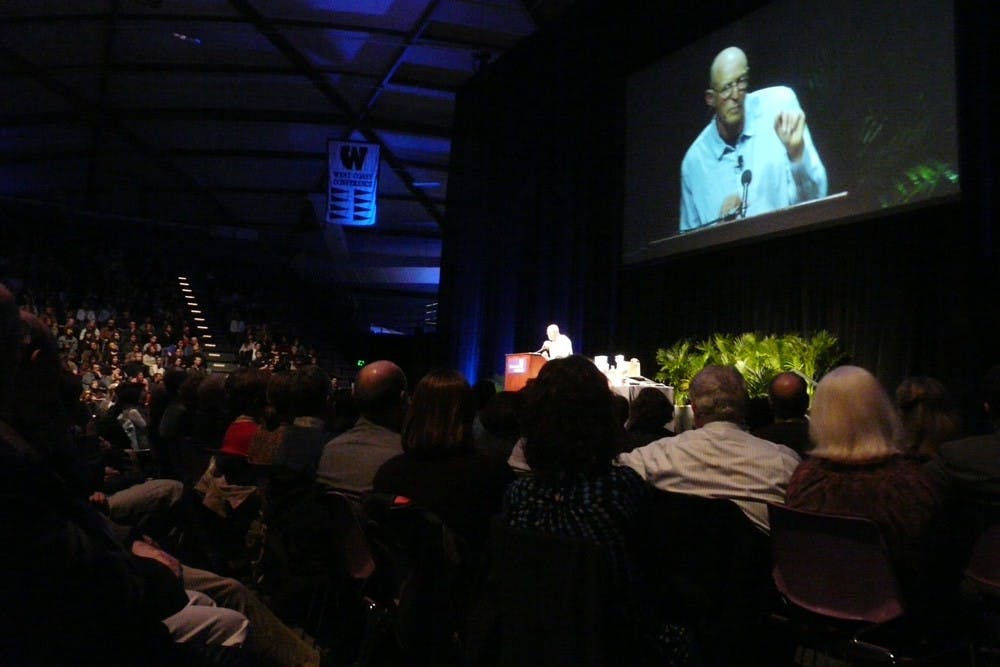“This little mantra: Eat food. Not too much. Mostly plants. And that’s really all you need to know.”
Michael Pollen speaks at UP - Spring 2011 (Alissa White -- The Beacon)
By Will Lyons, Staff Writer -- lyons14@up.edu
Armed with two bags of groceries from Fred Meyer, Michael Pollan took the stage to give the keynote address at the Food for Thought conference in the Chiles Center to more than 4,500 students, faculty and community members Saturday night.
He laid out a variety of what he called "food-like substances" such as an Eggo Real Fruit Pizza, Oreo sippers and Splenda with fiber, and then, for contrast, an apple to illustrate the rising prominence of processed foods in America and the industrial world.
Reiterating the mantra from one of his best-selling books, "In Defense of Food," Pollan ultimately left the crowd with a simple, practical message.
"I've boiled down everything I've learned about nutrition down to seven words," Pollan said. "This little mantra: Eat food. Not too much. Mostly plants. And that's really all you need to know."
Pollan had harsh words for what he called "nutritionism," or marketing ploys based on sketchy science that deceive consumers with bogus health claims.
"We have gotten to the point in food where we need a priesthood of experts, whether in industry, or medicine, or the nutrition establishment or government to mediate our relationship to food," Pollan said. "I submit that that is a very peculiar idea when you look at the long history of eating in our species."
Despite his criticism of the state of American health and the industrial food system, Pollan ended on a positive note, asserting that it's possible to improve the environment and personal health at the same time.
"Here is the missing – and I think marvelous – link. It turns out that what's best for our health is best for our agriculture too," Pollan said. "There's no trade-off between healthy eating and a healthy agriculture."
Pollan left a deep impression on faculty and students.
"I thought it was inspiring after reading his books to see him in person," English professor Cara Hersh said. "I loved his simple rules that anyone can follow."
"I really liked how he had just an apple on stage after pulling out a bag of processed foods," sophomore Hannah Fink said.
"I liked the bit about the priests of nutritionism being the ones to tell us how to eat," sophomore Ian Clark added.
Conference organizers were pleased with the turnout.
"I was thrilled to see how many people came on Saturday," environmental sciences Professor and chief organizer of Food for Thought Steve Kolmes said. "It brought together all the themes that matter to us: social justice, ecological development and a deeper understanding of world issues to name a few."
A theme throughout the weekend conference was keeping a positive outlook while facing the daunting task of reforming the food system, according to communication studies professor Renee Heath, whose Teaching our Leaders Civil Discourse (TOLCS) club hosted a community engagement session Saturday afternoon.
"People came up with some very good action items," Heath said. "The most important topics that came up were political change, community action and education about healthy eating."
The engagement session allowed TOLCS students to test their facilitating skills and come up with real world solutions related to food sustainability.
"It was well-structured, and we had good input," said TOLCS secretary Megan Brown, a junior. "I hope we can continue this trend in conferences to engage in civil discussion."
Presenters throughout the weekend included Kevin Concannon and Br. Dave Andrews, C.S.C., of Food and Water Watch, Congressman Earl Blumenauer and author of "Food Fray" Lisa Weasel.
The Food for Thought Conference's first speaker was UP alumnus Fedele Bauccio, CEO and co-founder of Bon Appétite and a member of the U.S. Pew Commission on Industrial Farm Animal Products.
"I want UP to be a model for sustainable food service," Bauccio said during his presentation Thursday night. "And I want to make sure that students leave here with an environmental attachment. Our students get it more than most people."
Bauccio focused on the harmful effects of antibiotics used in the meat industry in America and Canada. After a showing of "Frankensteer," a documentary highlighting the problems associated with hormone-treated beef, Bauccio hosted a meat tasting. Tasters sampled cage-free chicken tacos, free-range lamb kabobs, all natural pork and antibiotic-free, grass-fed steak.
"There was so much to sample," freshman Parker Mildenhall said. "I just grabbed about five plates of food and started to savor the flavor!"
The Food for Thought conference brought up many of the issues and deep-seated problems related to health in America and challenged participants to return to their roots and redefine what health means to them.
"Real health consists of a set of relationships between people and between our bodies and the plants and animals and soil that finally sustains us," Pollan said. "Food is not a product, we shouldn't think about it that way. It is less a thing, a pile of nutrients than a relationship between species and between people in a food chain."
(Alissa White -- The Beacon)
(Kevin Kadooka -- The Beacon)








